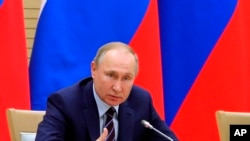Russian President Vladimir Putin has called current oil price levels "acceptable" in a possible sign that Moscow is willing to bend when the world's biggest oil exporters gather this week in Vienna to discuss supply curbs as coronavirus effects pummel oil demand and prices.
Putin also said Moscow was approaching a so-called OPEC+ meeting this week in Vienna as an "instrument for long-term stability," according to Interfax.
Reports last week quoted sources saying some influential OPEC members, including Saudi Arabia, were likely to call for a larger-than-expected reduction in oil output by the group as the global spread of coronavirus and related effects slow economies and depress international demand for oil.
But Russia was said to be resisting further curbs too far beyond an existing deal that has kept a lid on demand through the end of March.
"I want to stress that for the Russian budget, for our economy, the current oil price level is acceptable," Putin told Russian energy officials and producers gathered in Moscow to discuss the coronavirus and its implications on March 1.
He said Russia's budget assumes an average Brent crude price of $42.40 a barrel for supplies from the estimated $560 billion in oil reserves under Russian territory.
Russia's economy has recovered significantly from a downturn that followed its 2014 invasion and annexation of Crimea from Ukraine and a falling-off of oil prices around the same time, prompting painful measures that dented Putin's popularity well into his fourth overall term as president.
"Our accumulated reserves, including the National Wealth Fund, are enough for ensuring a stable situation, the fulfillment of all budget and social liabilities, even under a possible deterioration of the global economic situation," Putin said on March 1.
OPEC+, a group of OPEC's 14 members and 10 other major oil producers, has "proved to be an effective instrument to ensure long-term stability on global energy markets," Putin said, saying the cooperation had resulted in "extra revenues."
Last week, the ruble slumped to more than 67 to the U.S. dollar, its weakest level since early 2019, and its stock market slid amid a global sell-off and fears of tensions between Russia and Turkey amid competing military interests in Syria.




